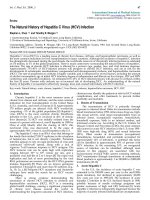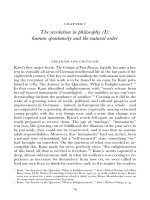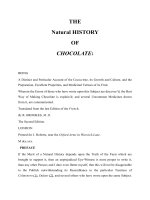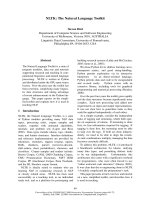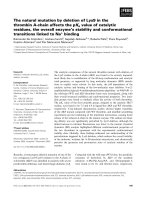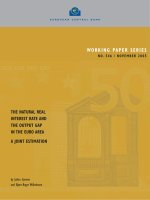The normative and the natural
Bạn đang xem bản rút gọn của tài liệu. Xem và tải ngay bản đầy đủ của tài liệu tại đây (4.98 MB, 357 trang )
THE
N O R M AT I V E
AND THE
N AT U R A L
M I C H A E L P. W O L F A N D
JEREMY RANDEL KOONS
The Normative and the Natural
Michael P. Wolf • Jeremy Randel Koons
The Normative and
the Natural
Michael P. Wolf
Washington, PA, USA
Jeremy Randel Koons
Doha, Qatar
ISBN 978-3-319-33686-2
ISBN 978-3-319-33687-9
DOI 10.1007/978-3-319-33687-9
(eBook)
Library of Congress Control Number: 2016942691
© The Editor(s) (if applicable) and The Author(s) 2016
This work is subject to copyright. All rights are solely and exclusively licensed by the Publisher, whether
the whole or part of the material is concerned, specifically the rights of translation, reprinting, reuse of
illustrations, recitation, broadcasting, reproduction on microfilms or in any other physical way, and transmission or information storage and retrieval, electronic adaptation, computer software, or by similar or
dissimilar methodology now known or hereafter developed.
The use of general descriptive names, registered names, trademarks, service marks, etc. in this publication
does not imply, even in the absence of a specific statement, that such names are exempt from the relevant
protective laws and regulations and therefore free for general use.
The publisher, the authors and the editors are safe to assume that the advice and information in this book
are believed to be true and accurate at the date of publication. Neither the publisher nor the authors or
the editors give a warranty, express or implied, with respect to the material contained herein or for any
errors or omissions that may have been made.
Cover illustration: © Denys Kuvaiev / Alamy Stock Photo
Printed on acid-free paper
This Palgrave Macmillan imprint is published by Springer Nature
The registered company is Springer International Publishing AG Switzerland
for Jocelyn
and
for Lucy
Acknowledgments
Much of our work on this book over the last four years has been done
at a great distance with the help of various forms of technology. This is
the way of things when the person with whom you share the strongest
sense of scholarly purpose lives 11,000 km and several time zones away.
Reaching a point where we could write such a work was never a solitary
affair, however, and we have benefited from the guidance and collegiality
of numerous philosophers, scientists, and other scholars over the years.
Among those who have been wonderful colleagues who offered one or
both of us support and insight in recent years are David Beisecker, Ron
Bayline, Donald Bruckner, Helen Daly, Willem DeVries, Geoff Georgi,
Matthias Kiesselbach, Hanna Kim, Lorin Lachs, Mark Norris Lance,
Steven Levine, Chauncey Maher, Peter Olen, Michael Oliver, Gregg
Osborne, Adam Podlaskowski, Michael Robinson, and Carl Sachs. The
advice of Carole Sargent was invaluable in coaxing grown-up, professional
behavior out of the two of us, as was the guidance offered by Matthew
McAdam. Emily Golling also provided valuable editorial assistance in
preparing the manuscript.
In preparing this manuscript, we benefited enormously from the support of Georgetown University and its Center for International and
Regional Studies (CIRS) in Doha, Qatar. CIRS hosted a one-day conference on a very drafty draft of our manuscript on March 8, 2015. This
conference brought participants to Doha and distributed the work of
vii
viii
Acknowledgments
commenting on our work in progress. We received enormously helpful feedback from Bana Bashour, Ray Brassier, Erhan Demircioğlu,
Anjana Jacob, Daniele Mezzadri, Niklas Möller, Jim O’Shea, John Ryder,
Matthew Silverstein, Lucas Thorpe, and Jack Woods. Jim O’Shea and
several others from our earlier list also offered helpful comments at our
session at the Summer Institute in American Philosophy in Dublin on
June 8, 2015.
Michael thanks Washington and Jefferson College for its support of
his research with a sabbatical during the fall semester of 2014. He would
also like to thank a number of people who made it possible for him to
contribute to this book during what have turned out to be several challenging years. Family members—Anne, Dan, Flynn, Liz Holtz, Sharon
Stewart, and George Halleck—have been enduring source of consolation, and restoration, and his gratitude for them is immeasurable. Jocelyn
Waite has been a source of love, encouragement, and inspiration, and
he is grateful to have such a partner in his life. For much of the last 15
years, Debbie Mix has kept him writing, both by example and by vocal
support, while Lauryn Mayer has kept him afloat in ways too numerous
to recount. Jim Behuniak, Matthew Burstein, Jack Thorpe, and Margaret
Weitekamp are damn fine people. Michael would run into a burning
building for any of them, not that he would have any particularly brilliant ideas what to do when he got there.
Jeremy would like to thank the Georgetown University School of
Foreign Service in Qatar for making his contribution to this book possible with a sabbatical during the fall semester of 2014 and also for a series
of Faculty Research Grants which enabled him to travel to Washington,
Pennsylvania, several times for intensive writing sessions. But most of
all, Jeremy would like to thank Lucy for all of the ways she supported
both the writing of this book and the process of getting it published.
Whenever Jeremy turned to her for help, as this project took shape, Lucy
always rolled up her sleeves, and for this, Jeremy will forever be in her
debt.
Contents
1
Naturalist Themes
2
Why Do We Need Normativity?
35
3
Against Supervenience and Reductionist Accounts
of Normativity
61
1
4
Truth and Pluralism
105
5
Interests, Embodiment, and Constraint by the World
139
6
Action-Guiding Content
179
7
Objectivity and Normative Discourse
221
8
Unity without Uniformity: Cross-Discourse
Contribution
265
ix
x
9
Contents
Weaving the Normative and Non-Normative Together
301
References
333
Index
337
List of Figures
Fig. 7.1
Fig. 7.2
Fig. 8.1
Fig. 8.2
The Kantian View
The “Head-On” View
Bilateral asymmetric contribution relations
Some bilateral asymmetric contribution relations between
psychology and economics
247
248
277
279
xi
Introduction
We live in a world of “oughts”: you ought not lie, you ought to believe
based on evidence, you ought to buy low and sell high. We are the sort
of creatures we are because the world and our comportment to it matter
to us. Whether we do well, think correctly, and do what is right are not
things we can simply report with disinterest; they are affairs in which we
feel the pull to engage and take responsibility for how we carry on. Our
lives unfold within social spaces that are composed of lattices of normgoverned practices. We come to have stories of ourselves as individuals as
we take up stances toward those practices, whether by endorsing them or
resisting them. We embrace our roles as teachers, as artists, as parents (to
name just a few); we take pride in work done well; we rail against injustice; we keep our promises (to name just a few). We thus find ourselves
engaged in normative discourse, in which we overtly declare, question,
command, and so on, how things are to be done and what is to be permitted, valued, or disvalued.
But we also inhabit a natural world, one (seemingly) devoid of our
institutions, values, and norms. In our encounter with the various phenomena of the natural world, we typically seek to explain them, and our
most comprehensive and explanatorily powerful accounts of this world
come from the natural sciences. We find ourselves embodied as biological
organisms, composed of physical parts bound together by fundamental forces. By many estimates, the scope and power of these explanatory
xiii
xiv
Introduction
approaches are so great as to render suspect anything that cannot be
reconciled with them. We may broadly characterize such approaches as
forms of naturalism. To be a naturalist in this sense is not to subscribe
to a particular set of theories, but rather to a particular conception of
our overarching intellectual project. We seek the most complete description of the world possible through scientific inquiry, and philosophy thus
becomes an ancillary—perhaps even disposable—form of inquiry, serving science’s needs where possible, and adopting its results.
It has long been thought difficult to fit these “oughts” into a scientific
world-view. For instance, moral wrongness is not something that science
discovers in the world, nor is it something you can detect or measure
in a laboratory. Or to borrow (and update) David Hume’s example, if
you examine the scene of a wicked act, such as murder, you may discover much forensic evidence—fingerprints, bloodstains, tire tracks, and
so on. But nowhere will you be able to find and catalog the wickedness
or wrongness. We face a problem in placing the normative within the
natural world, as some philosophers have put it. This problem is most
apparent when we make normative claims with apparently declarative
sentences (“Murder is wrong,” “This conclusion is unjustified”), which
will be our primary focus in this work.
Implicit in this tension is an assumption that despite the “pull” that
normative claims seem to have for us, they are, at some deeper level,
descriptions of a different order of facts. Where we call something good,
there would be some entity or property of goodness that made such
claims true or false; where some claim or behavior is incorrect, there
would be some standard to which it is held. If we assume there are such
entities or properties, then we owe some scientifically respectable account
of what they are and how they come to be. Many candidates have been
offered—people’s preferences, their desires, their methods of belief formation, or something else. In this way, it is thought, “oughts” are just
statements about the physical world, like any other statement. But many
find these approaches deeply unsatisfying. Those who emphasize normative dimensions of human lives often find such surrogates pale imitations
of normativity, while those who emphasize the importance of scientific
explanation frequently see no reason to posit robust, full-blooded normativity at all.
Introduction
xv
How do we reconcile these very different dimensions of our lives and
our world? One response from many philosophers amounts to a kind of
shrug at the apparent tension. There are simply many different sorts of
stories (or narratives, or practices, or discourses, or some similar philosophical device) that we tell in coping with our world, and there is no
perspective from which to tell a “final story of all things”, nor a historical
progression toward such a “final story.” To the degree that we still find
some value in telling any such sort of story, we are free to adopt or abandon it accordingly. The most prominent advocate of such a response in
recent decades was Richard Rorty, who repudiated the very idea that we
should answer the world in a way that could motivate such a problem.
We must confess a certain sympathy with more nuanced versions
of this response (though not much with Rorty’s in particular) in their
emphasis on multiple parallel approaches to understanding ourselves and
our world. But we must also confess that we feel the pull of many parts of
contemporary naturalist accounts, and we are wary of solutions that insulate philosophy from scientific inquiry. Many contemporary naturalists
have rightly pressed western philosophers on the presumption that there
is a set of methods by which philosophy can be conducted prior to and
independent of all other forms of inquiry. An important sense in which
we think we ought to be naturalists is in thinking that no type of theoretical project—whether it is metaphysics, semantics, ontology, or most
of all normativity—is conducted completely independently of the sort
of open, world-involving engagement pursued in the natural sciences.
We are especially apprehensive about approaches to normativity that add
mysterious entities to the world to bear its explanatory load.
But why, we ask, can we not have both? Why not adopt approaches
to philosophy that employ all the analytical sophistication and valuedriven inquisitiveness we know and love, but which open their borders
and weave those virtues in with the work we do in the natural sciences?
Why not have both full-blooded normative discourse and some suitably moderate form of naturalism? The crucial sticking point remains
the assumption that declarative assertions in normative discourse must
describe (or somehow reveal) some deeper level of natural facts in addition to their action-guiding import, and this deeper level of natural facts
simply cannot be placed in the world that naturalists describe. We will
xvi
Introduction
argue that this assumption is fundamentally wrong. Normative claims do
not aim, primarily, to describe; they urge us to do, or not do, something.
Normative claims tell us that a state of affairs ought to be, or not be, a
certain way.
With this in mind, we can pursue an alternative conception of normativity on which even its declarative statements are not stating facts.
Indeed, they are not making descriptive claims at all. Rather, such discourse serves a fundamentally action-guiding role: it prescribes behavior
(or proscribes it), or recommends a course of action (or recommends
against it), and so on. We will show how normative claims are constrained by how the world, even though they do not describe this world.
This constraint, combined with the availability of reasons and arguments
for and against normative claims, also has the benefit of preventing a
fall into relativism. If normative claims do not describe the world, then
they cannot be describing the world in a way that conflicts with science.
Thus, by abandoning the view that normative claims are in the business
of describing the world, we will show how to reconcile the normative
with natural science and a wealth of other forms of discourse.
The Road from Here
In Chaps. 1 and 2, we note that there are many competing proposals for
what sort of philosophical program the term “naturalism” should entail,
and just how much authority its demands should have for contemporary
philosophers. Rather than trying to sort through all of these competitors,
we concentrate on a number of methodological themes that run through
most self-identified naturalist accounts and explain why we have some
degree of allegiance with each of them. However, the normative is an
ineliminable part of our lives—including our scientific practices—and so
it is important to give an account of the normative that comports with
these naturalist themes.
In Chap. 3, we look at the prevailing views on how to place the properties of normative discourse in the physical world, that is, reductionism
and non-reductive supervenience. We argue that contemporary reductionist accounts do not fall prey to the naturalistic fallacy, but even their
Introduction
xvii
more sophisticated approaches leave us with a “normative surplus” that
cannot be reduced or identified with any items in the physical world.
Most importantly for our purposes, we see a common fault in such
accounts of looking for some non-normative correlate to do the work of
determining normative matters. We will argue that the very attempt to
find such a correlate is misguided, as no correlate would do. This leads us
to a discussion of deflationist accounts of truth and varieties of pluralism
in Chap. 4.
In Chap. 5, we introduce a theoretical notion of an interest. We argue
that interests are particularly important in understanding normative discourse as truth-apt and objective without appeal to normative objects
and properties. Interests are matters impressed upon us by the world,
rather than matters of assent and consensus. But they are not matters
of representation of some feature of that world, so there is not even a
purport to posit new entities that would vitiate naturalism. In Chap. 6,
we use this to initiate a novel account of action-guiding content for elements of normative discourse. We contend that claims made in normative discourse are expressive of something quite different from familiar
forms of descriptive discourse, but that this content is still something
that we believe and something that can be true or false. In Chap. 7, we
then offer an account of normative discourse that downplays its descriptive, fact-stating role. To do this, we build on work in Chaps. 5 and 6 to
demonstrate how normative claims can be non-relatively true and then
present an account of how the empirical can constrain the normative
even if normative discourse does not serve a fact-stating role.
In Chap. 8, we return to a theme introduced in Chap. 4. There, we
argued that even if we are committed to a non-reductionist account of
normative discourse, among many others, this cannot commit us to
“non-overlapping magisteria” of discourse in which the commitments we
make for one sort of theoretical project are insulated from those of others.
Taking cues from work in the philosophy of science, we argue that there
is another alternative open to us. One “region” of discourse may be said
to contribute to another in various theoretically fruitful ways. This has
the virtue of unifying different regions of discourse, rather than insulating them from one another, in ways that avoid reductionism while being
more conducive to the naturalist themes in Chap. 1. In Chap. 9, we build
xviii
Introduction
on the theme of contribution from Chap. 8. Here, we argue that there
are numerous ways in which normative discourse and non-normative discourse contribute to one another’s projects in fruitful ways without either
one reducing to the other.
1
Naturalist Themes
1.1
Naturalist Themes: Science, Ontology,
Anti-Transcendentalism
One of the great difficulties in deciding how to reconcile our fairly robust
views on normativity with naturalism is that there are about as many
forms of naturalism as there are naturalists. The label has been adopted
by or ascribed to philosophers as disparate in their views as John Dewey,
Frank Ramsey, Roy Wood Sellars, Wilfrid Sellars, Ernest Nagel, David
Armstrong, W.V.O. Quine, Thomas Kuhn, Philip Kitcher, Paul and
Patricia Churchland, J.L. Mackie, Philippa Foot, Aristotle, David Hume,
Ludwig Wittgenstein, Richard Rorty, and even Jacques Derrida (Staten
2008); to ordinary language philosophers, to experimental philosophers,
and to the entire pragmatist tradition. We do not confront a single doctrine in naturalism, but rather numerous methodologies, motivations,
and projects; which of these to adopt and which to dismiss will be substantial philosophical questions.
Perhaps one unifying feature in all the various approaches that lay some
claim to the title of “naturalism” would be a purport to treat humankind in all its various dimensions as part of the natural world without
© The Editor(s) (if applicable) and The Author(s) 2016
M.P. Wolf, J.R. Koons, The Normative and the Natural,
DOI 10.1007/978-3-319-33687-9_1
1
2
The Normative and the Natural
privilege, priority, or enchantment. This would generally entail a rejection of any “first philosophy” in the spirit of Plato that might precede our
observations, experiences, and practices. For some (but by no means all)
putative naturalists, this implies an especially close relationship between
the sciences and philosophy. This may grant scientific discourse a kind of
authority on certain questions, and by some estimates, good philosophy
will simply be those modes that clear obstacles for subsequent scientific
inquiry. The business of philosophy will be putting philosophy out of
business, either by assimilating philosophical projects to projects in the
sciences or by undercutting older philosophical modes, problems, and
assumptions altogether. As Quine said:
Is this sort of thing still philosophy? Naturalism brings a salutary blurring
of such boundaries… It undertakes to clarify, organize, and simplify the
broadest and most basic concepts, and to analyze scientific method and
evidence within the framework of science itself. The boundary between
naturalistic philosophy and the rest of science is just a vague matter of
degree. (1995, 256–257)
This will reek of treason to many philosophers, but this image of the
sciences eclipsing philosophy over time will have its critics even among
those named above. To some naturalists, the sciences are simply further
sets of historically conditioned social practices for coping with experience,
and they will have no ultimate authority over others. Rorty (1979, 1989)
made such claims explicitly and associated many of the more important
philosophical voices of the twentieth century with his project. That in
turn will sound like treason to more scientifically inclined naturalists,
but it suggests another way of interpreting the naturalist tenet that there
is no privileged position from which inquiry can begin. At most, we can
only articulate the significance of our practices from within the perspective they afford us, rather than holding them to some higher ideal such
as objectivity or progress. There is a reading of Thomas Kuhn’s work that
lends itself to this sort of naturalism.1 Where philosophers since the seventeenth century had generally sought to demarcate science from other
forms of discourse and grant it a greater measure of epistemic legitimacy
1 Naturalist Themes
3
in uncovering truths, Kuhn emphasized the importance of reading each
historical phase of scientific inquiry in its own light.
Rather than seeking the permanent contributions of an older science to our
present vantage, [historians of science] attempt to display the historical
integrity of that science in its own time. They ask, for example, not about
the relation of Galileo’s views to those of modern science, but rather about
the relationship between his views and those of his group, i.e. his teachers,
contemporaries, and immediate successors in the sciences… By implication, at least, these historical studies suggest the possibility of a new image
of science. (1970, 3)
That “new image” would thus abandon the view of science as a progressive, cumulative, world-representing enterprise rising above its time
and place, and instead treat it as a further set of problem-solving practices
best understood in light of their social and historical context. Science
itself would thereby become one more item to situate in the history of
natural world, rather than a means to step outside it and look back in.
Why should all of this concern us? Very little is at stake for the future
of any given philosophical project or method in the name that we assign
it. Yet we do think that there are issues of genuine philosophical concern
that we must address here, even in the absence of a single, unified doctrine of naturalism. While the many strains of naturalism at hand differ
greatly from one another, there is still a sense in which they are responses
to a common set of concerns that have some traction for us. Rather than
offering a unified doctrine of naturalism, we can approach the matter
thematically, by making explicit a number of these animating concerns
and illustrating how different forms of naturalism incorporate them. Not
all who call themselves naturalists will endorse all of these themes, but
there will be considerable overlap, and in our affinity to these themes, we
are closer to the naturalists than to most non-naturalists in contemporary philosophy. We see three major themes that cut across most of those
lumped together under the banner of naturalism: (a) a priority assigned to
scientific practices; (b) ontological and explanatory conservatism; and (c)
anti-transcendentalism. Once these themes are on the table, it will be possible to elaborate why we see each one concerns us as we offer our account.
4
The Normative and the Natural
1.1.1 Naturalism and the Priority of Scientific
Methods
Naturalists often grant some form of priority to the methods of the
natural sciences and their results. With a nod to Protagoras, Sellars said
“in the dimension of describing and explaining the world, science is
the measure of all things, of what is that it is, and of what is not that
it is not” (1956/1997, §42). In some cases, this priority is granted in
light of the predictive and instrumental successes of scientific practices.
Scientific methods and practices have proven themselves reliable sources
of knowledge, we might say, and there are no grounds but tradition and
dogmatism to assign them second-class status. This scientific orientation
overturns the Platonistic assumption that only the methods of philosophy
lay bare for us the real structure of the world, the nature of knowledge,
and the purpose of our lives in it. According to the most robust forms of
naturalism, there would be no special role left over for philosophy but to
clear the clutter and confusion that might inhibit scientific progress. “[It]
is within science itself, and not in some prior philosophy, that reality is
to be identified and described,” as Quine put the point, and this implies
the “abandonment of the goal of a first philosophy prior to natural science” (1981, 21, 67). Scientific practices would thus be at least the peers,
perhaps even the more able and enlightening successors, to the canonical
methods of philosophy.
How radically would this priority of scientific methods and results
reshape the landscape of our knowledge? Much of the debate on this
point has been shaped by Sellars’s “Philosophy and the Scientific Image
of Man” (1962), in which he claimed that modern philosophy generates the “manifest image” of the world, “a [philosophical] refinement
or sophistication of what might be called the ‘original’ image… which
makes it relevant to the contemporary intellectual scene” (§17). But
scientific practices will generate the “scientific image,” which at least
appears to supersede the “manifest image” from which it emerged. Sellars
suggested that we may hope to see our world through both images in
the future, but many naturalists have been less concerned with preserving our philosophical past. On such strongly science-friendly forms of
1 Naturalist Themes
5
naturalism, all of our theoretical understanding (including the crude
theories we call “common sense”) will give way to scientific successors
in the future (e.g., Churchland 1981, 1996; Stich 1983; Rosenberg
2014). Some would say that philosophy serves only to clarify and organize the work then undertaken in scientific practices (Quine 1969,
1995), while others have focused on naturalizing particular regions of
traditional philosophy such as language, mind, and knowledge (e.g.,
Millikan 1984; A. I. Goldman 1992; Rosenberg 1999; Kornblith
2002). More recently, some philosophers have applied methods from
social psychology to the critical examination of central philosophical
intuitions under the banner of “experimental philosophy” (e.g., Knobe
and Nichols 2007).
Outside the confines of academic philosophy, there is widespread
suspicion that even the most science-friendly proposals here are too little, too late for philosophy as a discipline. Stephen Hawking, perhaps
the preeminent public figure in the natural sciences in recent decades,
declares philosophy “dead” and that “scientists have become the bearers
of torch of discovery in our quest for knowledge” (Warman 2011). This
has brought charges of “scientism,” or a hegemony of scientific methods
born of dogmatism rather than innovation or insight. McDowell (1994)
and Margolis (2003) both resist philosophical trends they see as scientism,
for instance. To those more committed to “perennial philosophy,” this
overtaking of philosophy by scientific methods will seem unmotivated.
Science succeeds on its own terms, but scientific practices do not generate
the grounds for their own legitimacy. That we should value the knowledge or instrumental possibilities they produce and privilege them over
other methods and practices is not a matter that scientific practices even
purport to settle. Know-nothing declarations of disinterest in philosophy
do not eliminate these problems, so it will be premature to say that naturalism can set aside all philosophical reflection. Dan Dennett, a staunch
proponent of approaches to the mind deeply informed by the sciences,
struck a gently defiant note on the subject recently: “There is no such
thing as philosophy-free science, just science that has been conducted
without any consideration of its underlying philosophical assumptions”
(2013, 20).
6
The Normative and the Natural
We share with most naturalists the sense that scientific practices should
be granted some priority in “describing and identifying” the contents
of the world, as Quine put it, although we do not share the more radical ambitions of some forms of scientism to supplant all philosophical
(and other) discourse with some scientific successor. We see reason to be
catholic in our methods and practices, embracing whatever contributes
positively to our interests and goals in inquiry, and our scientific practices
have more than earned a place at the table at this point. Many philosophers are apprehensive about the crude myopia of dogmatic scientism,
and we share such apprehensions, but our response to this should not
be to circle the wagons around some idealized conception of philosophy
that insulates it from other forms of discourse.
Here, it may be helpful to bear in mind a distinction offered by Huw
Price between what he calls object naturalism and subject naturalism. An
object naturalist takes it that ontologically “all there is is the world studied by science,” and epistemically “all genuine knowledge is scientific
knowledge.” Subject naturalists take it that “humans are natural creatures, and if the claims and ambitions of philosophy conflict with this
view, then philosophy will have to give way” (2004/2011, 185–186).
Subject naturalists would incorporate scientific discourse into our philosophical self-reflection as a partner, even if this discourse does not replace
those reflective modes wholesale. Adopting such an approach will require
novelty and ingenuity to avoid either collapsing into scientism or diluting the role of scientific practices to window-dressing. We see this as a
tremendously difficult challenge, but just the one this naturalist theme
rightly prompts. Our goal should be a better fusion of those parts of science, philosophy, and many other practices that best inform our understanding and guide the pursuit of our interests. How all of those parts
should hang together, whether we should adopt new ones and abandon
old ones, and how we should conceive of our goals in this self-correcting
enterprise are all matters that we will find ourselves compelled to revisit;
and any conclusions we reach are provisional and remain open to future
challenges. But note that any such reflexive examination of our practices
will be a form of philosophical inquiry. We have every reason to assume
that philosophy will always be with us, even if it looks very different from
